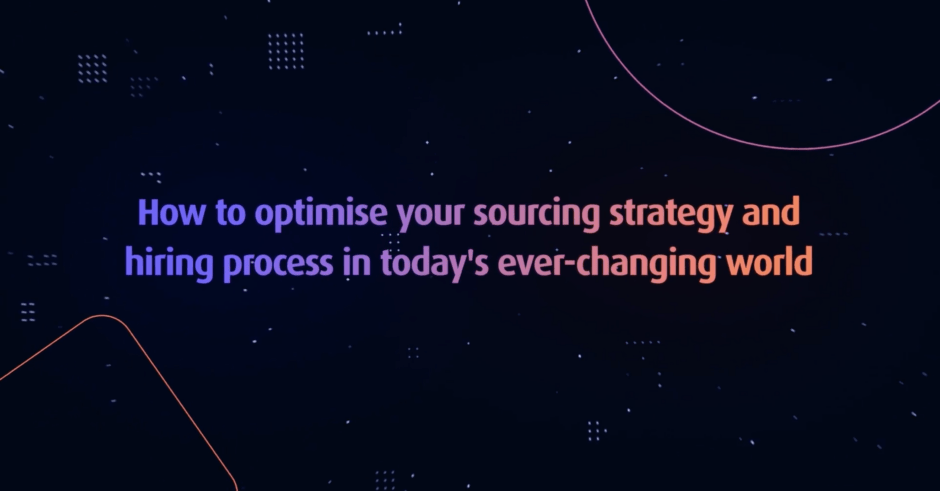Recruitment is at the forefront of everyone’s minds again. As 2021 draws to a close, sourcing strategies and hiring processes are high on many organisations minds with growth and attrition being top of the People agenda.
The BTN & Resource Solutions brought together some of the leading People executives across industry for an intimate discussion around optimising recruitment through the use of data, technology and digitalisation.
The session was hosted by Danny Brier (Sales Manager – EMEA at Resource Solutions), who led the session, which brought about the following talking points.
Technology should enhance not replace the people process
The move from transactional HR to a value-added strategic function has been a steady process for the People function but the past 18 months and beyond has been an effective stepping stone to embracing technology and ways of working that weren’t being rolled out ‘en masse’ prior to the pandemic.
The group spoke openly about how they believed they had begun to master the art of virtual recruitment but some of their biggest challenges were related to keeping candidates engaged in the section between accepting and joining and candidates then dropping out. There was a consensus of around 15-20% accepting and then dropping out, which was prevalent with in-demand roles in technology, for example. The ability for candidates to now run parallel processes has had a direct impact
Utilising data as a means of improving the recruitment process is possible by focusing and looking at the inefficiencies that are currently occurring such as time to hire or time to offer. If we can use data as talent availability points, we can start to make incremental improvements throughout the talent journey. Market data should become a key component of our talent journey where we can understand locations or industries that are struggling and try to engage their talent to enhance our skillsets in a specific area. We should be using operational excellence to look at competitors daily status updates with regards to EVP, research, content etc and utilise this competitor intelligence analysis to create an impactful candidate experience.
Recruitment will always be a people-first process but if we can use technology and data to enable us to make more astute decisions and create more efficient processes.
Will our data ever be good enough for AI to reap the benefits?
Data is only as good as you make it. One of the key talking points around the table was around the ability to utilise data to its full potential being only possible if the quality of the data was of sufficient quality.
There is an abundance of AI platforms coming to market on a weekly basis within the HR space but how can we make sure we have the basics right before we use these platforms?
The accurate recording of the data itself was a problem amongst the group due to external pressures and time pressures. We must get our hiring managers to use our systems the way they should be used and collate the data that will benefit the business in the long term. We must ensure that they manage the process on the system otherwise we are almost always going to operate with incomplete data.
If we have all the required data on the system, we can start to utilise technologies/platforms such as ones that help our job descriptions to become more gender-neutral or give us market information on the salary benchmarking.
If we are to ensure our basic data is up to date and logged correctly then we can start to use technology to see bias beyond just the CV with screening, sourcing focus, diversity metrics etc.
The question was asked as to how effective data actually is, in shaping decisions for your business? The group discussed how data can then be used as part of effective planning for the future. With the trends around workforce planning being high up the agenda, 80% of your planning is looking at historical trends and getting yourself ready for future hires. If your historical data isn’t correct then you can’t even begin to use technology to analyse, never mind start to use AI to take the next step.
We should be looking at what works now and aligning this with what we should be doing in the future. Technology will always be just an enabler but we should be trying to make decisions based on ‘our feel’ and then look at the data to back it up. We should be able to use data to back up statements we make or actually, we should find a statement, then look at how we can prove/disprove it through the use of data.
Interested in learning more about the topic? Resource Solutions have put together a whitepaper that explores what the 4th Industrial Revolution means for talent acquisition and HR professionals, and how you can plan for meaningful change. Download it here
About Resource Solutions
Resource Solutions is a provider of Recruitment Process Outsourcing (RPO) and Managed Service Provider (MSP) solutions. As part of the Robert Walters Group – a world-leading specialist professional recruitment consultancy, our business has considerable resources at its disposal. With a global footprint across 29 countries, we’re able to work in close partnership with organisations and manage everything from global accounts with demanding resourcing strategies to single sites with lower recruitment volumes.


